How Twitter felt about the sixth Democratic debate
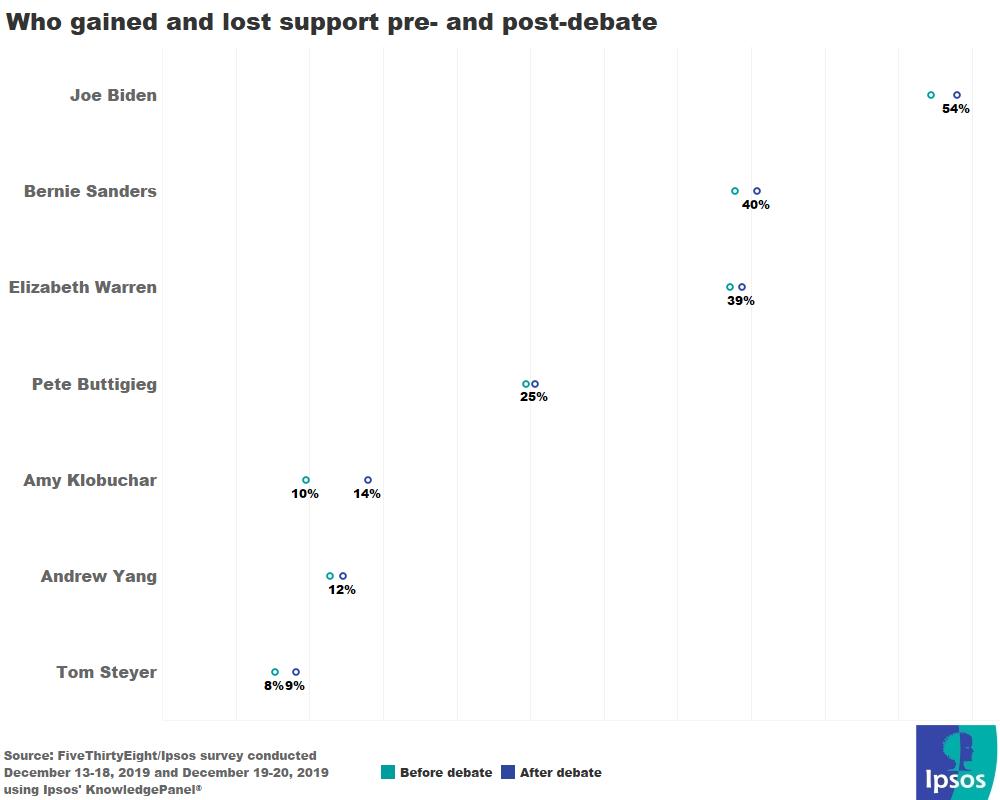
Thursday night’s Democratic debate viewership drew in an estimated 6.1 million viewers, the lowest yet.
This time around, the Democratic debate was a more intimate affair, with just seven candidates on the stage, down from 20 over the summer. Though Joe Biden, Bernie Sanders and Elizabeth Warren still command comfortable leads, as Sarah Feldman argues here, the debates are a prime time for second-tier candidates to make their case and potentially move the needle.
Once again, we tracked the proceedings via Ipsos’ live Twitter tracker to understand how viewers felt about candidates’ performances in real-time. As a quick explainer, Ipsos’ live Twitter tracker offers insight into which candidates are getting the most buzz on the platform and whether that chatter is positive or negative overall, by tracking net sentiment about candidates and the volume of candidate mentions per minute.
Which candidates did Twitter react most positively to?
Over the course of the night, Twitter responded the most favorably to Andrew Yang, Amy Klobuchar and Warren in terms of net sentiment. Yang and Warren also generated the most volume of Twitter mentions during the debate. In other words, their rhetoric got the most attention in addition to the most positive feedback.
In Yang’s case, he had a strong debate performance, but his Twitter performance was also likely boosted in part by his devoted Twitter following who rally under the hashtag #YangGang. There tends to be a steady patter of messaging about him on Twitter whether the debates are happening or not. We saw a similar response to Yang on Twitter in the last debate.
Warren’s situation is perhaps more interesting. Though indisputably still one of the top three frontrunners, she slipped a few points in the polls after releasing a widely critiqued Medicare for All proposal in October.
In November’s Democratic debate, her performance was somewhat quieter than usual, generating less attention on Twitter than her competitors. But this Thursday, she came out swinging, inspiring the most notable Twitter “moment” of the night.
Mentions of her soared after she fiercely defended her wealth tax plan. Asked by moderators to respond to economists' critique of her wealth tax, the Massachusetts senator simply replied, "Oh, they're just wrong."
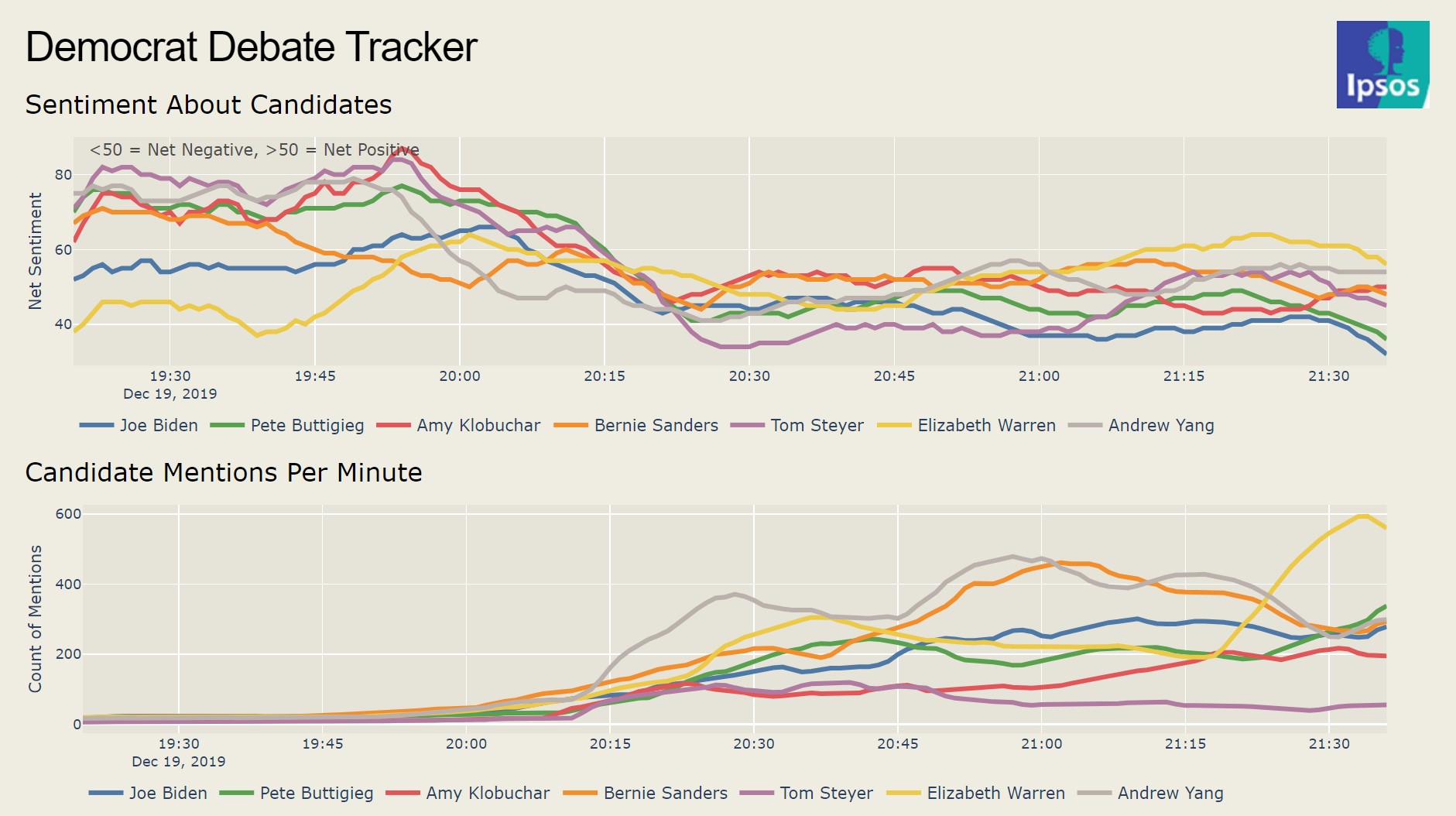
Additionally, Amy Klobuchar also had a strong performance.
Twitterverse responded to her positively, as it did during the last debate. However, she didn’t get as much volume of mentions as the frontrunners, illustrating her continued challenge. Despite getting good reviews she has not fully been able to break through the noise surrounding the first-tier candidates. But the volume of mentions about her was higher in this debate than the last, suggesting that her performance resonated with more people on Twitter.
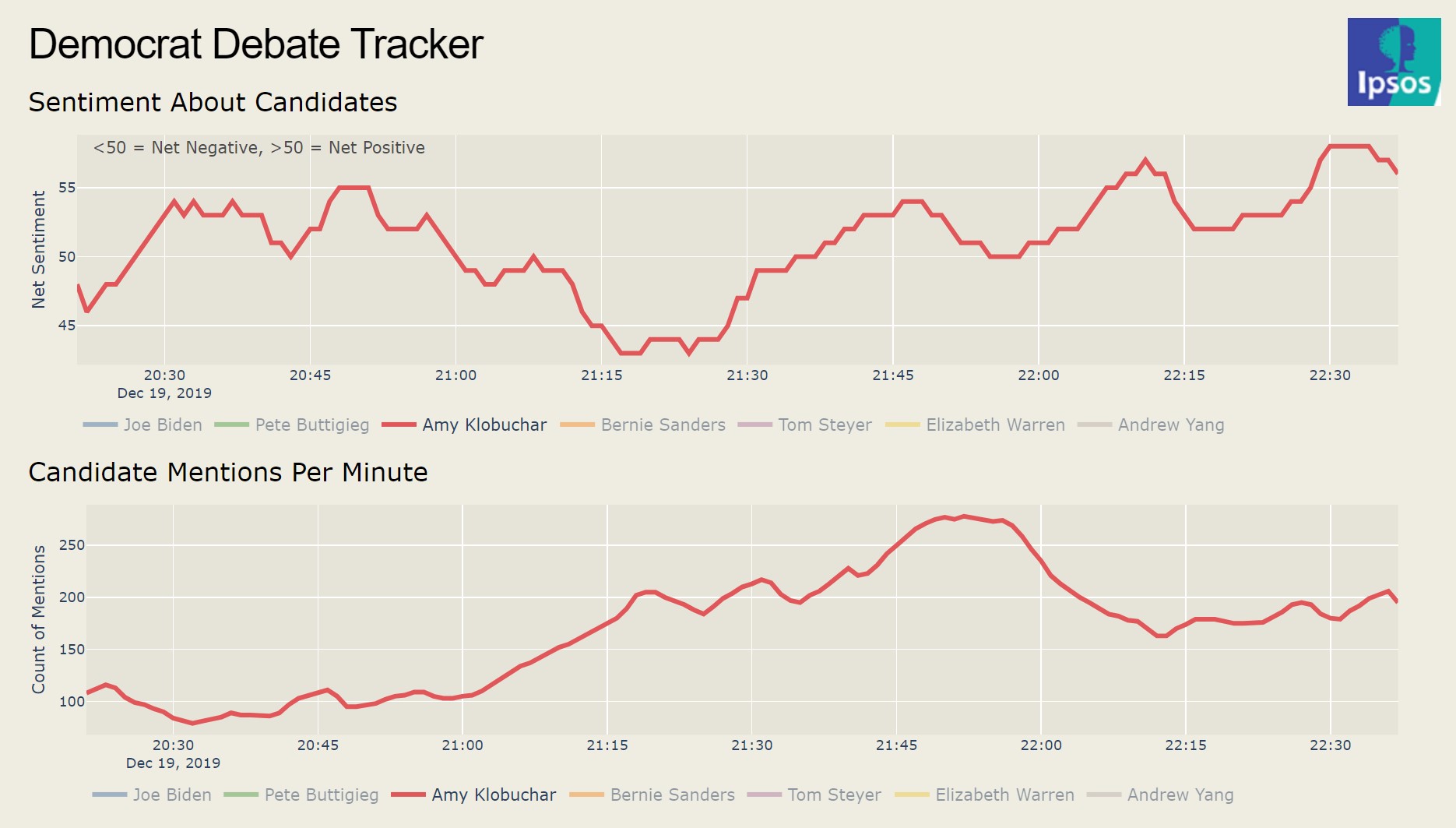
Iowa frontrunner weathers the storm
Pete Buttigieg is currently leading in the Iowa polls, which put a target on his back Thursday night. He was the subject of attacks from other candidates who see him as their direct competition.
A scuffle with Warren over his recent big-dollar fund-raiser held in an underground Napa Valley wine cellar (or, as Warren put it, a “wine cave full of crystals”), did not do him any favors on Twitter. Nor did a subsequent face-off with Klobuchar, in which Klobuchar attacked the South Bend mayor’s relatively limited political experience. Twitter took note of their sparring, as we can see from the rise in both candidates’ rise in mentions per minute. Sentiment about Buttigieg dropped while it rose for Klobuchar.
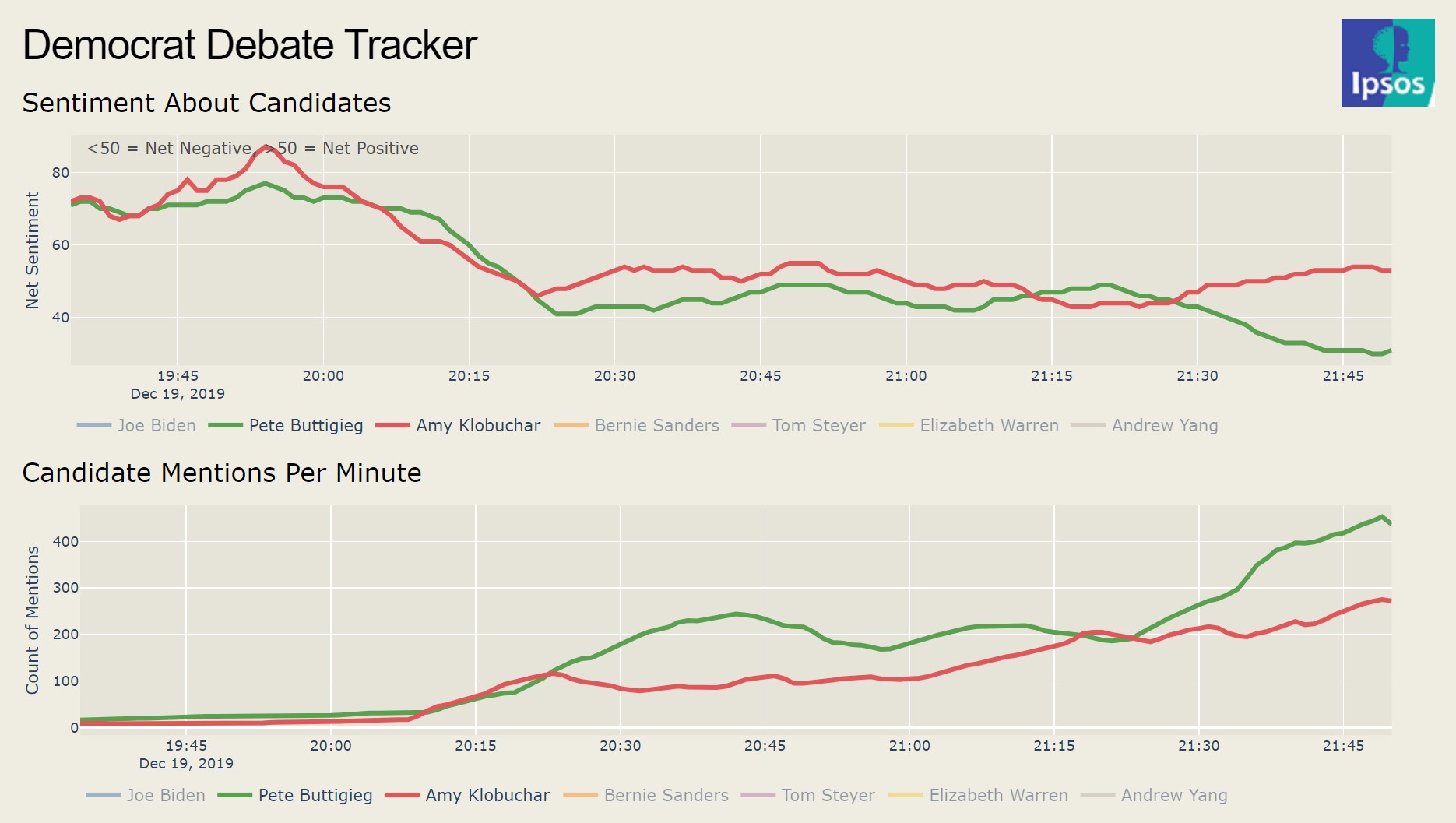
Sanders, Biden and Tom Steyer
Twitter had plenty to say about frontrunners Biden and Sanders throughout the night, though the commentary was less positive overall.
Sanders leaned into his progressive bona fides earlier on in the night, dismissing the USMCA trade deal and voicing support for both Israel and Palestine. But the chatter on Twitter about the Vermont senator dropped from positive to negative about halfway through the night.
Meanwhile, front-runner Biden’s one Twitter moment came when he inadvertently stuttered during the debate, leading ever-reactive Twitterverse to temporarily think he was mocking people with disabilities.
This turned out to not be the case. As Biden later explained on Twitter, “I’ve worked my whole life to overcome a stutter.”
And finally, we come to Tom Steyer, the billionaire candidate running on economic reform and climate change. Twitter did not have much to say about him, though what was being said was largely positive. This suggests that his adherents were talking him up but that he was not attracting much attention otherwise.
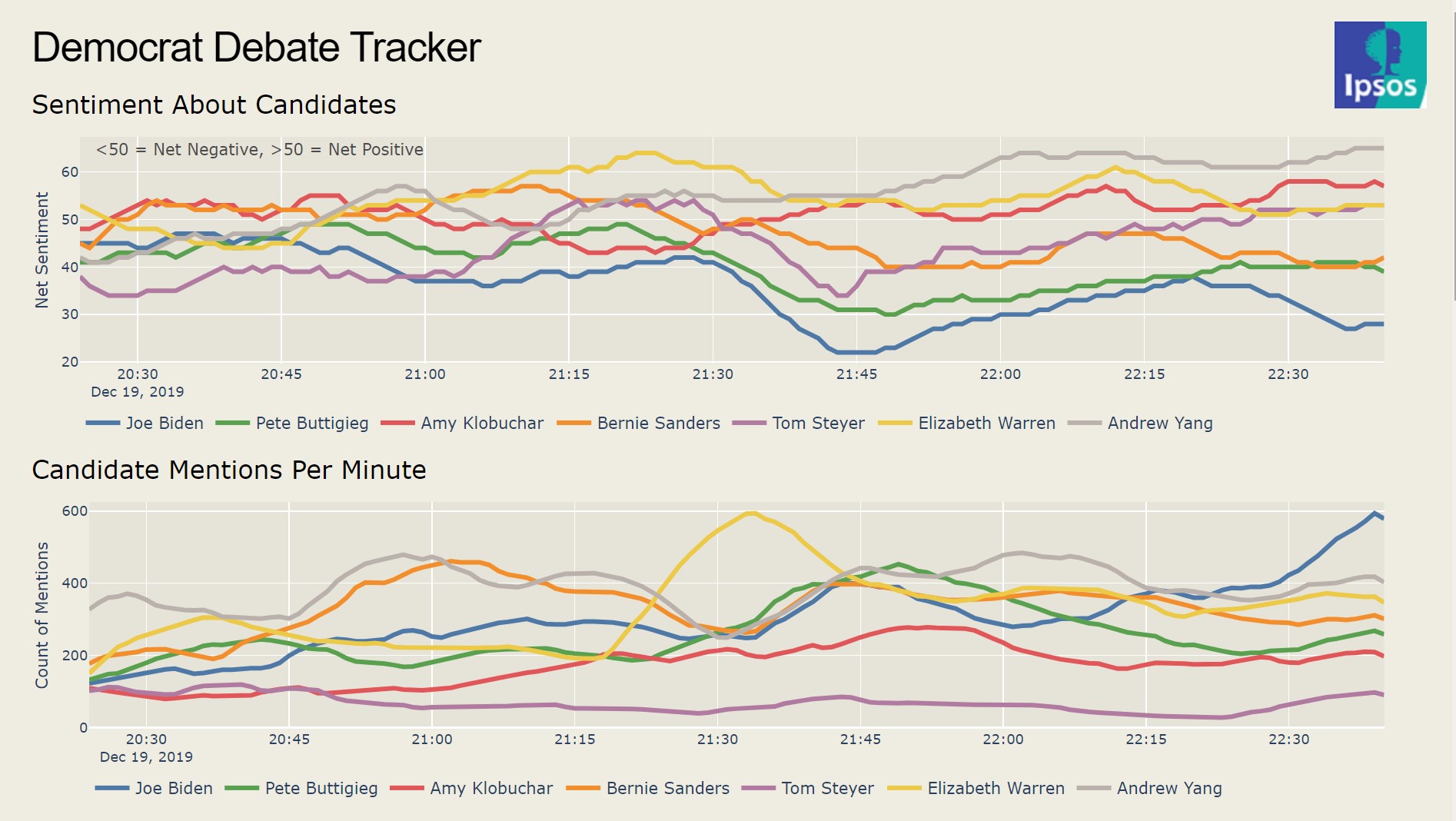
Wrapping up, how does all this square with the polling numbers?
Twitter, of course, is just one platform for self-expression and reflection. While mirroring and amplifying reality, it does not necessarily capture the full spectrum of voter opinion.
To see how Twitter sentiment aligns with public opinion, we turn to FiveThirtyEight/Ipsos pre- and post-debate polling. FiveThirtyEight/Ipsos polling reports that Yang and Klobuchar both jumped the most in terms of net favorability, which aligns with Twitter’s similarly favorable sentiment towards these two particular candidates.
Still, the race has not shifted much overall. The fundamental pecking order of who voters say they would vote for remains the same, with one notable exception: Klobuchar pulled just ahead of Yang.


